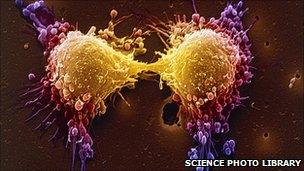Wales male cancer rate 'highest' in the UK
- Published

Two prostate cancer cells dividing
The cancer rate for men in Wales is the highest in the UK, according to the Office for National Statistics (ONS).
About 8,900 men in Wales are diagnosed with cancer each year.
The figures show the prostate cancer rate in Wales is 17% higher than the UK average, but the mortality rate is 1% lower.
The Welsh Cancer Intelligence and Surveillance Unit (WCISU) said the higher rates were due to "earlier diagnosis".
The latest figures, which relate to a period between 2005 and 2007, show that the cancer rate among men in Wales is 11% higher than the UK average. The mortality rate in Wales from cancer is only slightly higher than the UK average.
Shelagh Reynolds, general manager for the WCISU, which collated the figures for the ONS, said the higher incidence was impacted by the rate for prostate cancer, which is the most common cancer among men in Wales.
She said: "Current trends show an increase in survival in Wales, closing the gap on survival with other UK countries.
"While we do not have evidence to support it, we believe that the higher incidence rate may be attributable to... earlier diagnosis.
"This is borne out by the fact that although more men in Wales may be diagnosed with prostate cancer, there is no similar increased rate in mortality."
More than 500 men die from prostate cancer each year in Wales.
Ms Reynolds said the incident rate in Wales was also impacted by the fact Wales had the oldest population in the UK.
Ray Murray, chairman of prostate cancer charity Glaze, said more had to be done to diagnose prostate cancer in men earlier.
"We need the Welsh Assembly Government to approve a screening programme for men aged over 50 years old," he said.
Mr Murray said too many men were still unwilling to speak to their doctor.
"Men don't want to talk about potential problems, even if they know something is wrong," he said.
The Prostate Cancer Charity's head of policy and campaigns, Dr Sarah Cant, said: "Although the risk of prostate cancer increases with age, it is unlikely that the age of the Welsh population will account for this difference in incidence of the disease.
"This is because the rates are age-standardised, which means they take into account the age profile of each population and are calculated so that they can be compared with those of any other country in Europe."
Dr Cant said that the higher incidence in Wales could be due to increased detection of early prostate cancer.
She said: "For example, more men in the country may be deciding to have a Prostate Specific Antigen (PSA) test, a simple blood test that can be used to indicate a problem with the prostate.
"If the majority of cancers found as a result are non-aggressive and diagnosed at an early stage it is unlikely that they would lead to a greater number of deaths from prostate cancer due to the treatment options available."